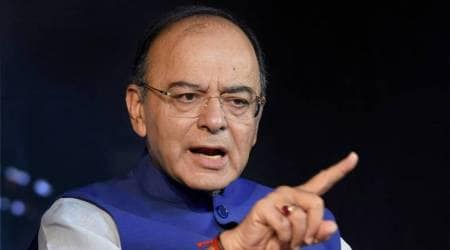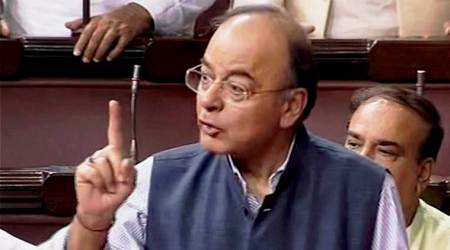 Union Finance Minister Arun Jaitley File/PTI Photo
Union Finance Minister Arun Jaitley File/PTI Photo
Finance minister Arun Jaitley on Saturday said the Election Commission has failed to check the use of “invisible money” in the Indian democracy for the past seventy years and when a solution is being proposed in the form of electoral bonds to tackle this problem, the Commission is finding “problems” with it. He said no political party has come forward to suggest a better system than the electoral bonds despite being asked for their suggestions.
“For seventy years — we have to honestly introspect and that is a problem that I am grappling with right now — for seventy years, India’s democracy has been funded by invisible money, Elected representatives, governments, political parties, Parliaments. And I must say that the Election Commission completely failed in checking it,” Jaitley said at the Delhi Economics Conclave, 2017, organised by the finance ministry.
“And, therefore, having failed to check it for seventy years — as to how the world’s largest democracy is itself being funded today — the solution doesn’t lie in finding fault or problem with every solution that is suggested, and therefore, in the last budget, I did suggest a solution. We are actively working on it. I have asked political parties, both orally in Parliament and in writing, to offer a better solution. Not one have come forward till date, because they are quite satisfied with the present system,” he said.
In recent meeting with finance ministry officials on electoral bonds, the Election Commission officials have raised issues of transparency in the structuring of these bonds. EC officials have also raised concerns related to recent amendments in the Representation of the People (RP) Act, which exempts political parties from disclosing donations received through electoral bonds.
Jaitley said the present government has tried to disrupt the “Indian normal” which accepted dealings in black money. Initiatives like demonetisation and the Goods and Services Tax will make “generation of cash a lot more difficult” and lead to greater tax compliance and greater digitisation, he said, adding that improvements in direct and indirect tax collections already point towards these measures having been successful.
“The decisions (on curbing black money) will not only have a great long term positive impact but these also have an ethical rationale behind it,” he said. While the first decision of the government to enact a law imposing severe penalties on people stashing black money abroad “shook the system”, the government’s crackdown on shell companies and the imposition of the benami law has sent “shivers down the spine” of tax evaders, he said.
“One easy format of conversion had always been the shell companies; a benami route that was followed through multi-layering of companies and then introducing cash in the books and bringing it back as your own income. This had almost become a standard operating procedure, not just for businesses, but also used for round-tripping corruption money by politicians, civil servants,” he said.
Arguing the government has already started action against such companies under the benami law which came into force last year, Jaitley said“ the sooner this business of routing this money through the shell companies collapses, the better it will be for the formal economy in this country.”
With the enactment of the Insolvency and Bankruptcy Code, the government has also tried to shake the belief “that the money borrowed from banks need not be repaid.” The code will help in resolving bad loans and money stuck in projects.
“You can’t have structured businesses operating on the premise that bank-funded money is never to be paid back. We had a sufficient belief in this argument which had gone to an illogical extent and created the problem that banks face today,” Jaitley said.
“More as a lawyer, which was my earlier profession, rather than as a minister, I was quite surprised by an argument
being entertained in court recently that there is a right of equality in the matter of not paying the banks back…So the system really needed to be shaken,” he added.

